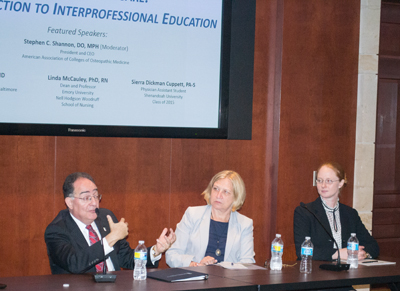Perman Promotes IPE on Capitol Hill
University of Maryland, Baltimore (UMB) President Jay A. Perman, MD, urged a standing-room-only audience at the U.S. Capitol on June 25 to support interprofessional education in health care with funding and needed policy changes because “there’s mounting evidence that this kind of team-based care improves patient outcomes while reducing health care costs.”
Perman was joined by Linda McCauley, PhD, RN, dean of the Emory University School of Nursing, Sierra Dickman Cuppett, PA-S, a physician assistant student at Shenandoah University, and moderator Stephen C. Shannon, DO, MPH, president and CEO of the American Association of Colleges of Osteopathic Medicine, on a panel formed to help explain to invited members of Congress and their staff how team-based care works and what measures are needed to help the health care system of the future evolve.

The current health care model, Perman explained, is fragmented. Physicians, pharmacists, dentists, social workers, lawyers, and other professionals practice independently, typically treating patients only within their own specific disciplines and without the benefit of others’ expertise. “In a fragmented system, it’s not necessarily the case that things will go wrong,” he said, “but there’s a higher likelihood that they will not quite go right and this is particularly true with patients suffering from chronic illnesses who have multiple needs spanning many health and social service disciplines.”
Panelists agreed that the result is not only less beneficial to patient outcomes, but also needlessly expensive. “Patients with chronic diseases are the heaviest users of health care, and when their diseases are not managed collaboratively, they are the heaviest users of the most expensive health care, emergency in-patient treatment,” Perman explained. He added that patients with chronic illnesses receiving team-based care make fewer visits to emergency departments, suffer fewer complications, and are better able to manage their illnesses than patients receiving traditional care.
McCauley urged additional support for research to prove the effectiveness and cost efficiency of team-based health care. “We need demonstration projects that show you can’t afford not to deliver care like this,” she said.
Financial support from federal and state governments is also needed, Perman said, to prepare today’s faculty, who only learned the old model of care, to prioritize IPE and teach it to students. “You can’t just throw people together and tell them to perform like an orchestra,” he said. “We need to prepare the professionals that we are educating and training now how to communicate effectively in a team, to understand what each profession brings to the patient and to the client setting, and to be open to perspectives and the contributions of others. And in order to do that, we need to have the means to train our faculties.”
Training tomorrow’s health care delivery team and creating a framework for that team to flourish, however, are two very different problems, panelists noted. For the system to work, every member of the health care team must be appropriately compensated, Perman noted. “When those of us who advocate for interprofessional care talk to the practice community and talk to the payers, the response is ‘oh that sounds great. That’s the right thing to do, but who’s going to pay for it?’ When I see a patient, I can drop a bill. My nurse practitioner colleague can drop a bill. But we don’t have payment systems that allow most of the team to get paid.”
Photo above: Perman speaks on panel with McCauley and Cuppett


